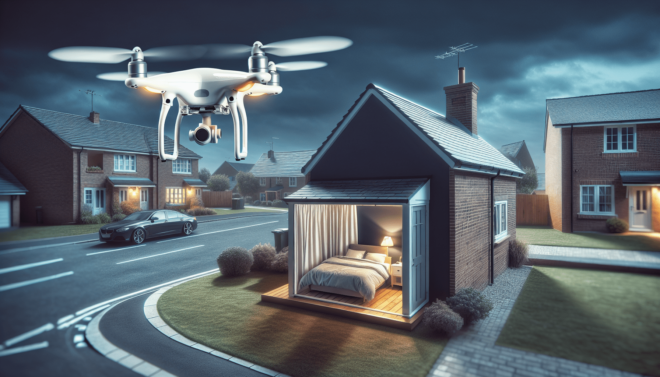What Are The Ethical Considerations Of Using Drones?
Introduction
Drones have become increasingly popular in various industries, from photography and videography to agriculture and surveillance. However, the use of drones raises ethical considerations that need to be carefully examined. In this article, we will explore some of the ethical implications of using drones and how they impact society.
Privacy Concerns
Drones equipped with cameras have the ability to capture images and videos from high altitudes, raising concerns about invasion of privacy. Imagine someone flying a drone outside your bedroom window, capturing intimate moments without your consent. This intrusion can make individuals feel violated and vulnerable. As drones become more advanced and widely used, it is crucial to establish regulations to protect individuals’ privacy rights.
Data Security
With drones collecting vast amounts of data through cameras, sensors, and GPS technology, there is a risk of data security breaches. If this information falls into the wrong hands, it could be exploited for malicious purposes. Companies and individuals operating drones must prioritize data security measures to prevent unauthorized access and protect sensitive information.
Safety Risks
One of the most pressing ethical considerations of using drones is the potential safety risks they pose to individuals and property. Drones have been known to malfunction, crash, and even collide with other aircraft. In crowded areas or events, a drone accident could result in serious injuries or damage. It is essential for drone operators to adhere to safety regulations and guidelines to minimize the risks to public safety.
Civil Liberties
The use of drones for surveillance purposes raises concerns about civil liberties and government overreach. Law enforcement agencies and other authorities can utilize drones to monitor individuals without their knowledge or consent. This unrestricted surveillance can infringe on people’s rights to privacy and freedom. It is crucial to have clear guidelines and oversight to ensure that drones are not misused for surveillance purposes.
Environmental Impact
Aside from the ethical considerations related to privacy and safety, the use of drones also has environmental implications that need to be taken into account.
Carbon Footprint
Drones are powered by batteries that require charging, which contributes to their carbon footprint. The manufacturing process of drones also consumes resources and produces emissions. As the popularity of drones grows, so does their environmental impact. It is essential for drone manufacturers and operators to prioritize sustainability and eco-friendly practices to reduce their carbon footprint.
Wildlife Disturbance
The noise and presence of drones can disturb wildlife, causing them stress and disrupting their natural habitats. Birds, in particular, can be startled by drones flying overhead, leading to negative consequences for their health and well-being. Operators should be mindful of wildlife habitats and take precautions to minimize disturbance when using drones in natural areas.
Social Justice
In addition to privacy, safety, and environmental concerns, the use of drones also raises social justice issues that must be considered when evaluating their ethical implications.
Accessibility
Drones are often seen as cutting-edge technology that can enhance various industries. However, the high cost of drones and their equipment can create barriers to access for individuals and communities with limited financial resources. This lack of accessibility can exacerbate existing social inequalities and widen the digital divide. Efforts should be made to make drones more affordable and accessible to ensure that everyone can benefit from their potential.
Job Displacement
The automation of tasks through drones can lead to job displacement, particularly in industries where drones are used for repetitive or manual labor. As drones become more sophisticated and capable of performing complex tasks, there is a risk of human workers being replaced by machines. This shift in employment dynamics can have profound social and economic implications, impacting livelihoods and contributing to income inequality. It is essential to consider the potential consequences of job displacement when integrating drones into various sectors.
Regulatory Framework
To address the ethical considerations of using drones, it is crucial to establish a robust regulatory framework that governs their use and ensures ethical standards are upheld.
Licensing and Certification
One way to mitigate safety risks and ensure responsible drone operation is through licensing and certification requirements for operators. By mandating training and assessments for drone pilots, authorities can ensure that they have the necessary skills and knowledge to operate drones safely and ethically. Licensing also provides a way to hold operators accountable for any violations of regulations.
Privacy Regulations
To protect individuals’ privacy rights, it is essential to implement clear and stringent privacy regulations that govern the use of drones. These regulations should outline the permissible uses of drones for data collection and surveillance, as well as the requirements for obtaining consent and safeguarding personal information. By setting strict guidelines for privacy protection, authorities can prevent abuse and misuse of drones for invasive purposes.
Transparency and Accountability
Transparency and accountability are key principles that should guide the ethical use of drones. Operators should be transparent about their drone activities, including the purpose, scope, and impact of their operations. They should also take responsibility for any negative consequences that arise from their drone use, such as privacy violations or safety incidents. By promoting transparency and accountability, stakeholders can build trust and foster responsible drone practices.
Conclusion
As drones continue to revolutionize various industries and sectors, it is crucial to consider the ethical implications of their use. From privacy concerns and safety risks to environmental impact and social justice issues, drones raise complex ethical considerations that require careful deliberation and regulation. By addressing these ethical considerations and implementing ethical standards, we can harness the benefits of drones while minimizing their negative impacts on society.

